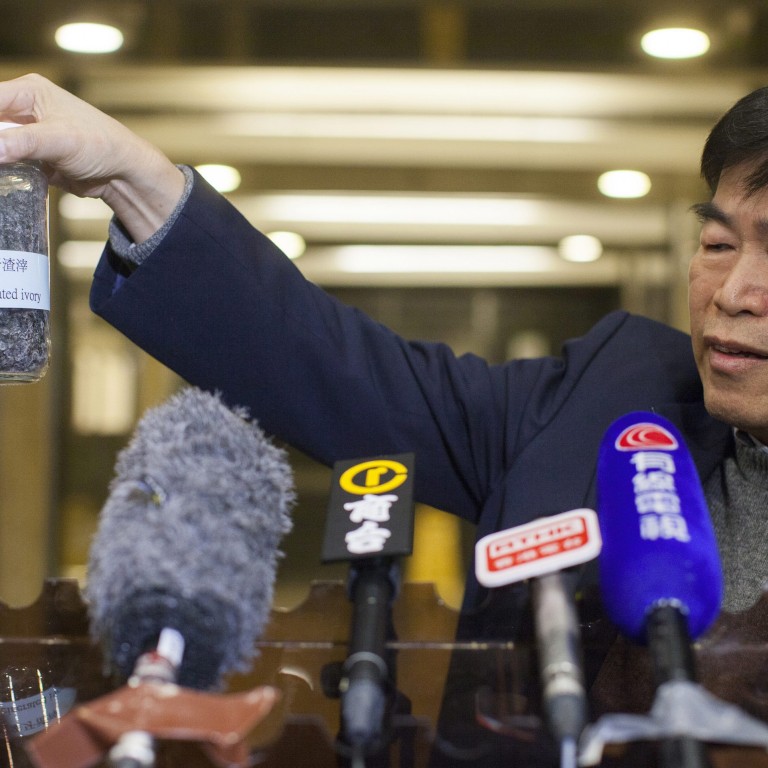
Hong Kong takes the world closer to ending ivory's bloody trade
Patrick Bergin applauds decision to follow others and destroy its cache
Hong Kong's Endangered Species Advisory Committee has agreed unanimously to incinerate most of the city's stockpile of confiscated ivory, which, at an estimated 30 tonnes, is one of the largest in the world.
Hong Kong's role as an epicentre of the booming ivory trade makes the decision truly extraordinary. It's an encouraging sign that Africa's elephants, which are being poached by the tens of thousands each year, may soon have more campaigners and protectors working for their survival than ivory consumers and poachers working against it.
One of the best protections for Africa’s elephants is a non-existent market for ivory
Hong Kong is a major destination and transit hub for trafficked ivory. In recent years, its busy ports have witnessed some of the largest seizures of illegal ivory, as elephant tusks concealed in hidden compartments or underneath other products in shipping containers flow to Hong Kong's shores from Nigeria, Togo, Tanzania and other countries. In spite of these seizures, for every shipment of illicit ivory that is caught, many more go undetected by officials, destined for the region's many carving factories before their contents end up displayed in shop windows and living rooms.
The Environmental Investigation Agency estimates that up to 90 per cent of ivory in China is illegal.
Most consumers who buy an ornately carved tusk or smooth ivory bangle are unaware of the true cost of their purchase. They do not connect their newly acquired item with the slaughtered elephant from which it came, or the terrorist group or armed militia which it funded. The price tag on an ivory item these days ought to reflect the price of undermining peace and security in Africa, or jeopardising the survival of an iconic species.
This is why Hong Kong's decision is so important. It will raise awareness among Hong Kong's ivory collectors and those who aspire to own ivory about the network of poachers, traffickers and kingpins engaged in the bloody business of bringing their ivory to market.
With the decision, Hong Kong will soon join a growing list of source, transit and consumer countries that have destroyed their caches of ivory in recent years and declared with their action that they value living elephants above rooms packed with ivory from dead ones.
In 2011 and 2012, two elephant-range countries in Africa - Kenya and Gabon - torched their ivory stockpiles. Last June, the Philippines crushed and burned its ivory, the first time an ivory-consuming nation had taken such a step. This was followed last autumn by the world's second-largest market for ivory - the US - destroying all six tonnes of its confiscated ivory.
Finally, a little over two weeks ago, authorities in Guangdong fed six tonnes of ivory into a pair of crushing machines.
Ahead of next month's wildlife trafficking summit in London, member countries of the European Union are being asked to destroy their ivory stockpiles. Hong Kong's decision will keep the momentum going.
As a conservation group working in Africa, we see first-hand the devastating impact the world's addiction to ivory has on Africa's elephants. The bullet-ridden and poisoned carcasses of thousands of elephants litter the forest floors and savannas.
This is not a war that can be won by putting more boots on the ground or just increasing security around national parks. Many of the hardest hit elephant populations are in remote forests or unstable regions, where rangers and protected areas are few but willing poachers and cash-strapped militias proliferate.
One of the best protections for Africa's elephants right now is a non-existent market for their ivory. Simply put: when consumers stop buying, elephants will stop dying.
The tide is hopefully turning and none too soon.
